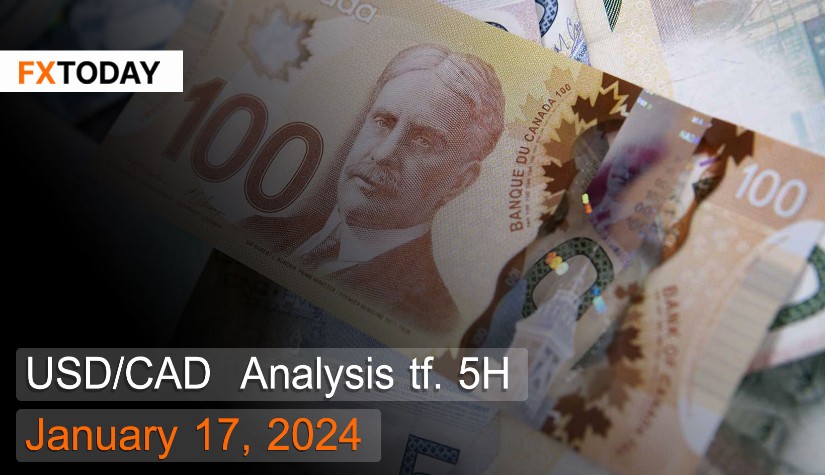The inflation rate in Canada has been trending upward until mid-year.
The Canadian dollar continued to weaken in January amid strong pressure from the rapidly strengthening U.S. dollar. Investors are closely watching policy decisions from the Bank of Canada and the U.S. Federal Reserve, with uncertainty about a potential interest rate cut by the Fed. Additionally, concerns about inflation have resurfaced in Canada, putting pressure on the Bank of Canada to see a sustained slowdown in inflation before considering an interest rate cut this year.
The inflation rate in Canada increased by 3.4% on a year-over-year basis in December, in line with signals from the Bank of Canada indicating that general inflation rates are expected to continue rising, reaching close to 3.5% by mid-year. This may prompt policymakers to raise interest rates again to combat the rising inflation. The increase in inflation is attributed to the rising prices of gasoline, leading to higher transportation costs. Moreover, housing inflation remains persistent at 6%, resulting in a rental price increase of over 7.7%.
The number of housing units in Canada increased by 18% from the previous month, reaching 249,255 units in December, surpassing market expectations of 243,000 units, according to the Canada Mortgage and Housing Corporation. The increase is driven by a 20% growth in housing units in major cities, fueled by a rise in condominium construction. However, single-family homes in urban areas decreased by 2% to 43,242 units due to high borrowing costs and labor shortages.
Wholesale trade in Canada increased by 0.9% year-over-year in November, amounting to 82.5 billion Canadian dollars, rebounding after a 0.5% decline in the previous month. This growth was supported by a 3.3% increase in sales of motor vehicles and a 1.5% increase in household durable goods sales.
Canada's industrial sales increased by 1.2% from the previous month to 71.7 billion Canadian dollars in November. The recovery is attributed to rapid sales growth in the chemical products and machinery sectors. Meanwhile, the automotive industry experienced the largest decline in sales due to the closure of major Canadian auto assembly plants for lengthy equipment repairs.
The yield on Canada's 10-year government bonds increased by over 3.35% in the past week. The rising inflation rate led investors to anticipate that the Bank of Canada is unlikely to reduce interest rates in the near future. There are expectations for a potential interest rate cut in July, moving it from the previously speculated date in April before the inflation rate announcement.
Techical analysis data (5H)
Resistance: 1.3538, 1.3549, 1.3570
Source: Investing.com
Buy/Long 1: If the price touches support in the price range of 1.3483 - 1.3505 but cannot break the support at 1.3505, you may set a TP at approximately 1.3549 and SL at around 1.3473 or according to your acceptable risk.
Buy/Long 2: If the price breaks the resistance in the price range of 1.3538 - 1.3549, you may set a TP at approximately 1.3570 and SL at around 1.3483 or according to your acceptable risk.
Sell/Short 1: If the price touches resistance in the price range of 1.3538 - 1.3549 but cannot break the resistance at 1.3538, you may set a TP at approximately 1.3483 and SL at around 1.3570 or according to your acceptable risk.
Sell/Short 2: If the price breaks the support in the price range of 1.3483 - 1.3505, you may set a TP at approximately 1.3473 and SL at around 1.3549 or according to your acceptable risk.
Pivot point January 17, 2024 05:45 PM. GMT+7
|
Name
|
S3
|
S2
|
S1
|
Pivot Points
|
R1
|
R2
|
R3
|
| Classic | 1.3473 | 1.3483 | 1.3505 | 1.3516 | 1.3538 | 1.3549 | 1.3570 |
| Fibonacci | 1.3483 | 1.3496 | 1.3504 | 1.3516 | 1.3528 | 1.3536 | 1.3549 |
| Camarilla | 1.3517 | 1.352 | 1.3523 | 1.3516 | 1.3529 | 1.3532 | 1.3535 |
| Woodie's | 1.3477 | 1.3485 | 1.3509 | 1.3518 | 1.3542 | 1.3551 | 1.3574 |
| DeMark's | - | - | 1.351 | 1.3518 | 1.3543 | - | - |
















